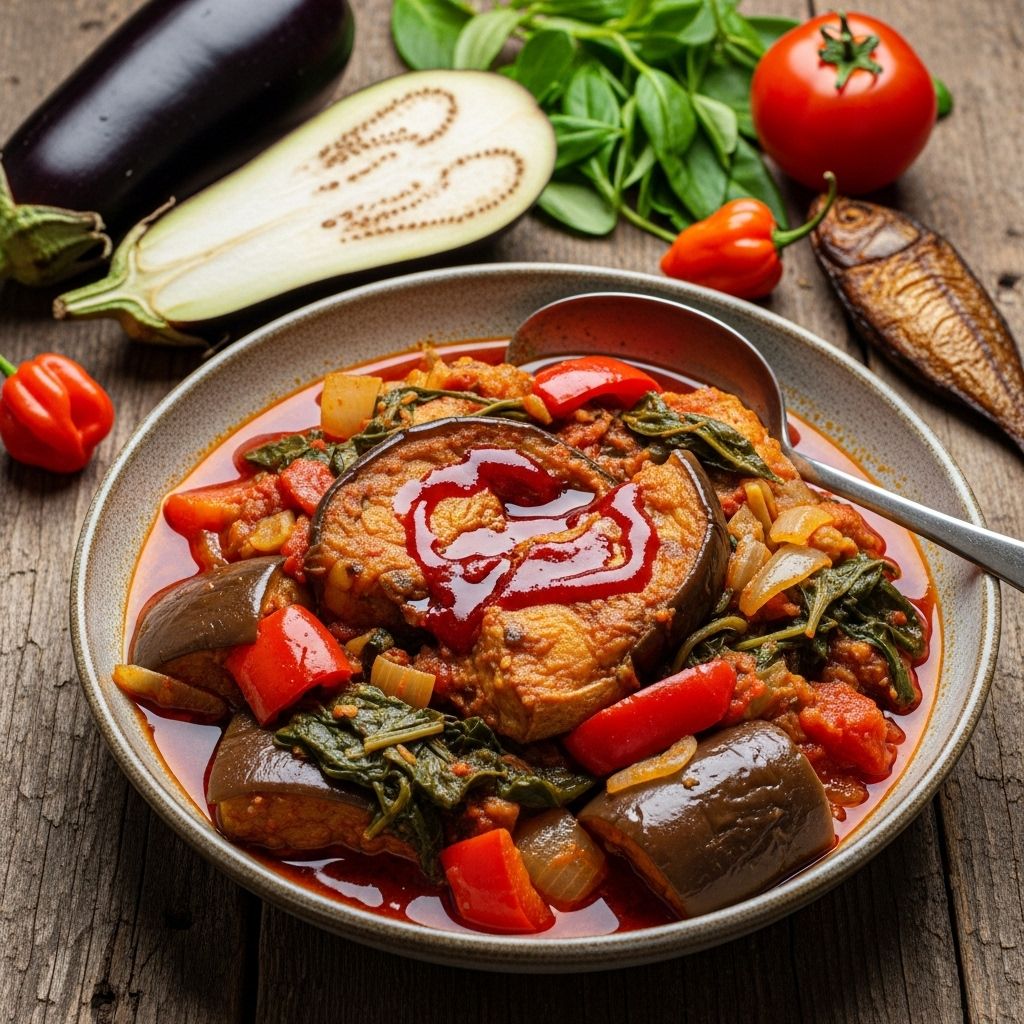Nigerian Eggplant Stew (Garden Egg Stew): A Flavorful Classic
Subtle heat and earthy oils meld with tender garden eggs for a deeply savory dinner.

Nigerian eggplant stew, also known locally as garden egg stew, is a richly layered and beloved dish from West Africa, celebrated for its robust flavors and comforting, home-cooked appeal. This stew not only shines as a main course but also holds a place of pride in Nigerian festivals, Sunday gatherings, and everyday family meals. In this comprehensive article, we delve into the unique ingredients, the cultural roots, step-by-step preparation, serving ideas, and expert tips for mastering this classic. Whether you are a curious cook or an aficionado of African foods, let this guide illuminate the delicious world of Nigerian eggplant stew.
What Are Garden Eggs?
The heart of this dish is the garden egg, a local term for a small, round variety of eggplant commonly grown and eaten across West Africa. Garden eggs come in multiple hues—most commonly green and white—and set themselves apart from the familiar purple eggplant found in Western supermarkets. Their delicate bitterness, subtle sweetness, and spongy texture allow them to absorb rich stew flavors beautifully.
- Green garden eggs: These are typically small, with a bright, bitter note and slightly firm texture. They hold shape well in stews.
- White garden eggs: Slightly larger, they are milder and add a creamy quality to the stew.
If you can’t access African garden eggs, small Thai eggplants or peeled Italian eggplants can serve in a pinch, though local varieties retain a more authentic flavor and texture.
Historical and Cultural Significance
Garden egg stew occupies a special space in Nigerian culinary heritage. It is often prepared to welcome guests, feature on special occasions, or simply to comfort family as a hearty, weekday meal. The stew’s adaptability—incorporating locally available fish, vegetables, and traditional seasonings—makes it a foundation of the Nigerian kitchen.
In southern Nigeria, the garden egg is considered a symbol of hospitality and abundance. Offering dishes made with this ingredient to guests sets a warm, inviting tone and showcases the richness of local produce.
Key Ingredients in Nigerian Eggplant Stew
Here are the core ingredients that bring this stew to life:
- Garden eggs (or Thai eggplants): The base of the dish, boiled and mashed for texture.
- Palm oil: This earthy, red-hued oil imparts deep flavor and vibrant color. If unavailable, a neutral oil can be substituted, but the result won’t be as traditional.
- Fresh tomatoes: Adds balance and acidity, blending into the stew’s base.
- Onion: Sautéed for aromatic depth.
- Scotch bonnet or habanero pepper: Lends heat and fragrance; adjust to taste.
- Smoked mackerel: Offers smokiness, body, and savory complexity. Can be replaced with fresh fish or omitted for a vegetarian version.
- Basil or scent leaves: Called “efirin” locally, these add herbal brightness.
- Optional dried shrimp: Enhances umami and seafood flavors.
- Seasonings: Stock cubes or bouillon, plus salt.
Each family may add their own touches—swapping in goat meat, using different local herbs, or experimenting with available vegetables.
Step-by-Step Preparation Guide
- Prepare the Garden Eggs
- Remove garden egg stems, halve or quarter, and wash thoroughly.
- Boil in salted water for 10–15 minutes until fork-tender.
- Drain and, while still warm, mash to a slightly chunky, tomato-like texture using a potato masher or fork.
- Prepare the Other Ingredients
- Slice onions in half-moons, dice tomatoes, rough-chop basil or scent leaves.
- Flake smoked mackerel after removing skin and bones.
- Sauté the Aromatics
- Heat palm oil in a deep pan over medium heat (do not overheat, as palm oil can quickly bleach).
- Add onions and chopped pepper; sauté until softened, lightly browned at the edges.
- Build the Base
- Add diced tomatoes; cook, stirring often, for 20 minutes. The mixture thickens and oil rises to the top, showing readiness.
- Add Eggplant Mash
- Stir in mashed garden eggs. Continue cooking for 5 minutes to meld flavors.
- Finish the Stew
- Add smoked mackerel, optional dried shrimp, bouillon, and salt. Simmer gently for a few more minutes.
- Taste and adjust seasoning (extra pepper for more heat, more salt or bouillon for depth).
- Stir in chopped basil or scent leaves. Turn off heat to preserve the herbal aroma.
- Serve and Enjoy
- Serve warm alongside boiled yam, plantains, white rice, steamed potatoes, or soft bread.
Tips for Success
- Do not rush the tomato frying step; properly cooked tomatoes deepen flavor and reduce sourness.
- If using standard eggplant, peel to avoid bitterness, and choose specimens with firm flesh and minimal seeds.
- Palm oil is traditional but can be moderated or substituted with sunflower or canola oil for a milder flavor.
- For a vegetarian stew, omit smoked mackerel and dried shrimp; double the amount of mushrooms or use tofu for texture.
- Basil/scent leaves should be added last to retain their bright, fresh flavor.
Serving Suggestions
Nigerian eggplant stew is versatile and pairs well with many starchy sides. Traditional and popular pairings include:
- Boiled yam: Perfect for scooping up the saucy stew.
- Rice: White, brown, or even local pilafs form a great base.
- Plantains: Either fried or boiled, for sweet contrast.
- Crusty bread: Ideal for dipping to soak up the delicious sauce.
Ingredient Substitutions and Variations
| Traditional Ingredient | Possible Substitution | Notes |
|---|---|---|
| Garden eggs (green/white eggplant) | Thai eggplant, peeled Italian eggplant | Texture and taste may vary; peel standard eggplants for milder flavor |
| Palm oil | Sunflower, canola, or peanut oil | Less traditional; palm oil is key for color and earthiness |
| Smoked mackerel | Fresh mackerel, smoked trout, canned tuna, or omit | Omitting makes dish vegetarian/vegan |
| Dried shrimp | Fresh shrimp, mushroom, or omit | Use mushrooms for vegetarian depth |
| Scent leaf (Nigerian basil) | Thai basil, Italian basil, or even fresh parsley | Can mix herbs for unique profile |
Expert Tips for Authentic Stew
- Source or substitute with the freshest eggplants for best results—garden eggs bring authentic flavor, but experiment if needed.
- Smoking your own mackerel at home or lightly grilling it will intensify the stew’s flavor profile.
- Start with minimal salt or bouillon, tasting as you go; ingredients like smoked fish and dried shrimp can already be quite salty.
- For a smoky, spicy dimension, add a pinch of extra dried chile after the stew simmers.
- If texture is too thick, adjust with a little vegetable stock or reserved cooking water from the garden eggs.
Health Benefits of Nigerian Eggplant Stew
This dish is not only flavorful but also nutritious. Garden eggs are a low-calorie source of dietary fiber, vitamins (especially B vitamins and vitamin C), and antioxidants. Using smoked fish and shrimp adds lean protein and trace minerals, while using tomatoes and fresh herbs packs in additional antioxidants.
- Eggplants aid digestion and promote steady blood sugar.
- Tomatoes boost immunity and heart health.
- Palm oil, in moderation, provides vitamin E and beta-carotene.
Frequently Asked Questions (FAQs)
Q: Can I make garden egg stew vegetarian or vegan?
A: Absolutely. Omit smoked fish and dried shrimp, and instead use more mushrooms or eggplant for richness. Use vegetable bouillon for seasoning.
Q: What can I use if I can’t find garden eggs?
A: Small Thai eggplants or peeled Italian (globe) eggplants are good substitutes. Peel for milder taste and tender texture.
Q: Is palm oil required?
A: Palm oil is traditional and gives a unique flavor and color. If unavailable or preferred, sunflower or canola oil can be used, but the flavor will differ.
Q: What side dishes pair best with this stew?
A: Boiled yam is classic, but rice, plantain, or simple crusty bread all make excellent companions.
Q: How do I store leftovers?
A: Cool completely, then refrigerate in an airtight container for up to 3 days. Reheat gently on the stovetop—add a splash of water if too thick.
Exploring More Nigerian Flavors
If you want to dive deeper into the diverse world of Nigerian stews, try classic recipes like spinach stew (Efo Riro), Yoruba-style tomato stew, or spicy peanut stew (Groundnut Stew). Each offers a window into regional varieties and showcases how local produce shapes traditions on the West African table.
Garden egg stew is more than just a dish—it’s a culinary connection to heritage, home, and community. Whether prepared for a festive feast or a simple weekday dinner, this savory, aromatic stew brings warmth and delight to every table.
References
Read full bio of Sneha Tete












